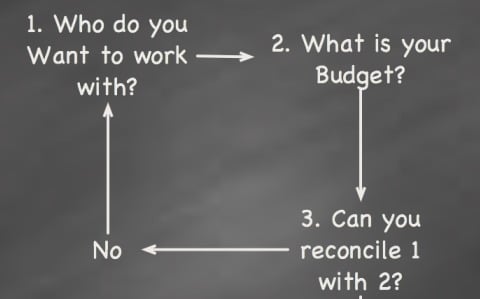I’ve been running my own freelance consultancy business for nearly six months now, hardly any time at all, but before that I ran architects practices and can see how difficult everyone who purchases finds this.
Make sure you ask yourselves the right questions, in the right order.

Who do you want to work with?
You must find this out first. If you start with 2 then you’ll end up working with the wrong person.
What is your budget?
You must find this out next. If you don’t have a budget, then don’t complain when the consultant quotes you a price – this means that you do have a budget, you don’t want to say what it is.
Can you reconcile consultant with budget?
This is the crucial bit. To get the results you want you must pay somehow. If you choose the right consultant and manage the costs at least you will get part of what you want now, and good quality.
The temptation is to choose a cheaper option, get more for your money. But if you choose the wrong consultant because you won’t pay for a good one, you will simply be throwing all that money away.
Some of my clients have spent the last year or even 18 months paying the wrong people to do the wrong thing badly. Why not instead find the best person to do the job and talk to them about your budget?
What do you think?

I like the saying “If you think hiring an expert is expensive, try hiring an amateur”. This usually happens when budget is the first thought over short term rather than long term.
A consultant who costs £X now may save you £XX further down the line.
Great post.
Thanks for the reply Pritesh.
Value is the most important thing a consultant can give you.
I find many of my clients have budget at the top of their agenda and when you are up against some people who literally work for nothing then it can make your job difficult.
Often I know when I am quoting against one or two who make a habit of vastly undercutting others and equally know that if the client chooses them they will pay more in the long run due to poor drawings, design and detailing.
What you cannot do is let the client know this directly. All I can really do is sell myself and what I offer.
Hi Dylan,
Yes it is challenging. I guess one of the reasons for my post was to point out the issue of long term value. Worth remembering when we are buying things that we aren’t always comparing like with like.
Hi Su
Like the post.
Seems obvious but I’d probably add a step before 1 above.
Step 1. Understand and clarify why you need a consultant/external partner?
I’ve worked in a few client side organisations where the assumption is that in-house is usually best. This might be true in some cases, but rarely works out as resources and priorities often conflict, leading to project creep and deadlines being missed. Once you have established this, you can then confidently start approaching relevant consultants or partners. It also helps with briefing which is essential in developing a relationship with prospective consultants.
In fact more consultants and agencies should provide clients the option of using a briefing template or similar. I have seen a few that work well in getting “us” the prospective client, to identify things we might not do following our own briefing sheets.
Can also help in clarifying objectives, aims, audiences and possible budget ranges. Helps make negotiation open and transparent and firms up the parameters of engaging a consultant or partner.
Thats a very good point Robert, yes I have left out the ‘find out what you want/need’ process, and it does help this part go smoothly.
Internal/external is an interesting issue in itself. Something for another post methinks!
Robert,
It often takes an expert to educate a client on Why they need an expert. It can easily be a vicious cycle. Warm regards from Los Angeles,
Emmanuel
Thanks for your marvelous posting! I really enjoyed reading it. I want to encourage you to definitely continue your great job!
Our Company in Costa Rica works to promote sustainable and efficient architecture.
Congratulations for this good post.